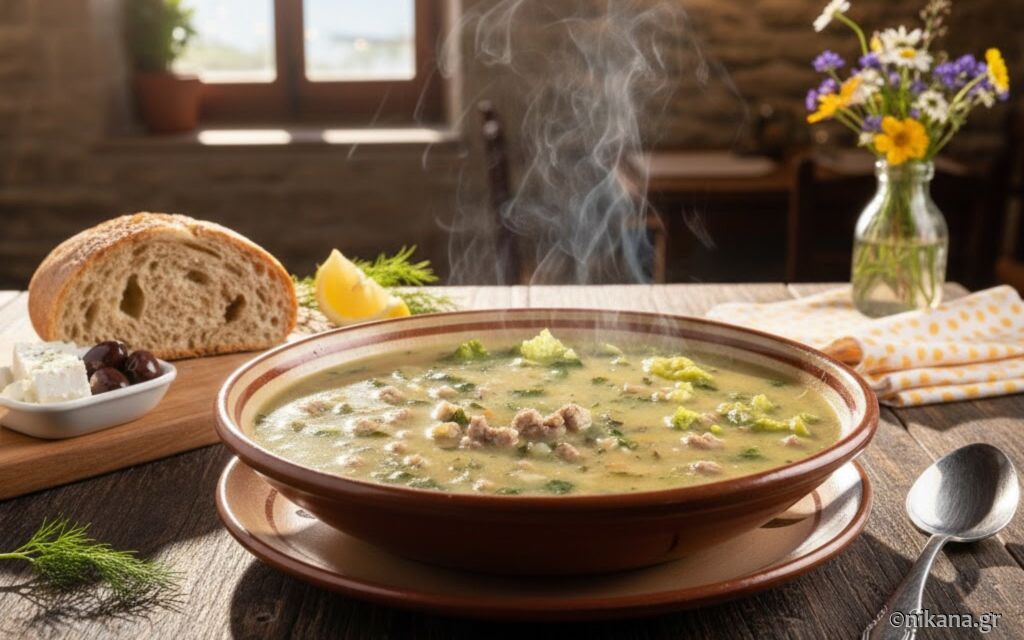Greek Easter Traditions: Magiritsa – the Traditional Soup Served After Midnight Liturgy
The Taste of Easter - discover how the Greeks prepare the traditional Easter soup made from offal. Magiritsa is prepared exclusively for Easter in Greece and is eaten right after the midnight liturgy, as it holds a special symbolism - it marks the end of the Great Lent, which lasts for 40 days.
After the believers light the candles with the Holy Fire and return from the church, they gather around the table with this warm soup that symbolically marks the end of fasting and the beginning of celebration. The tradition of tapping red eggs starts in the church after the midnight liturgy and continues at the table with magiritsa. After magiritsa, everyone in Greece will indulge in a sweet bread called tsoureki, decorated with a red egg in the middle. You can find out more about this sweet traditional bread here: Tsoureki - traditional sweet bread and delicious treat.
After the meal, many continue the celebration in the streets, taverns, or at friends’ houses - until the early morning hours. It is a night when the streets come alive, and the festive mood is transferred from sacred places to everyday life.
Read a detailed description of Easter customs here: Easter in Greece - customs, tradition, and holiday atmosphere
Read about the experience of celebrating Easter on your favorite Thassos here: Easter on Thassos
Magiritsa Recipe
Ingredients:
1 kg lamb liver
lamb intestines
1 onion
5 stalks of young garlic
green lettuce, chard, or sorrel (optional)
bunch of fresh dill
½ cup rice
½ cup olive oil
salt, pepper
1 egg
juice of 2 lemons
Preparation:
Boil the liver and intestines for 10-15 minutes, then chop into cubes. Fry in oil for about 10 minutes, add the onion and fry briefly. Add water (about 2 cups) and cook for 10-15 minutes. Add young garlic, greens, and dill and cook for about 30 minutes, adding water as needed. Season with salt, pepper, and add rice. Cook for another 15 minutes. Let it cool.
For avgolemono (lemon-egg sauce): Beat the egg white, add the yolk and lemon juice, then gradually add the cooled soup while stirring. Finally, mix everything in a saucepan and reheat before serving.
Note: The soup can be made without intestines - only with liver, or even with chicken liver as a substitute.
Recipe by Natasa Parlic Ex Stevanovic
Enjoy and Christ is Risen!
Why Magiritsa?
After a long fast, the body does not immediately tolerate heavy, greasy food like roast, so traditionally a lighter soup is eaten first - but from the parts of the lamb that will not be used for lunch the next day (offal). Thus, magiritsa emerged as an economically and health-wise sensible meal: utilizing everything and gradually acclimating the body to stronger food.
Since When Is It Prepared?
The preparation of magiritsa has roots in the old customs of rural Greece, but it became particularly common during the 20th century, when festive tables and the preparation of lamb became a standard part of Easter. Magiritsa always became the first on the table after midnight, and it is often prepared in some households just because of tradition - even though not everyone likes it.
Fun Fact:
On Greek forums, culinary websites, and even in shows about tradition, divisions often arise:
“Ή τη λατρεύεις ή δεν μπορείς να τη βλέπεις” (”Either you adore it or you can’t stand looking at it”) but most will tell you: “It is the taste of Easter.”
We are always here to help you explore Greece! Follow us for the latest information, useful tips and authentic experiences to spend an unforgettable vacation in Greece!
We offer over 3,000 accommodations. Choose the right one for you and your family HERE.
Follow us on social networks where we regularly share exclusive offers, discounts and special arrangements for vacations in Greece as well as information, advice and useful news.
Facebook:Nikana.gr
Instagram: @nikana.gr
Tiktok: nikana.gr
Facebook grupa: Live from Greece
YouTube kanal @NikanaTravel
Write to us at e-mail: nikana@nikana.gr
Our site nikana.gr is the leading source of information about Greece.







Post a Comment
NOTE
All your questions in the comments will receive an answer via email so check your inbox shortly after you posted comment. For more detailed questions and responses, contact us via mail nikana@nikana.gr.